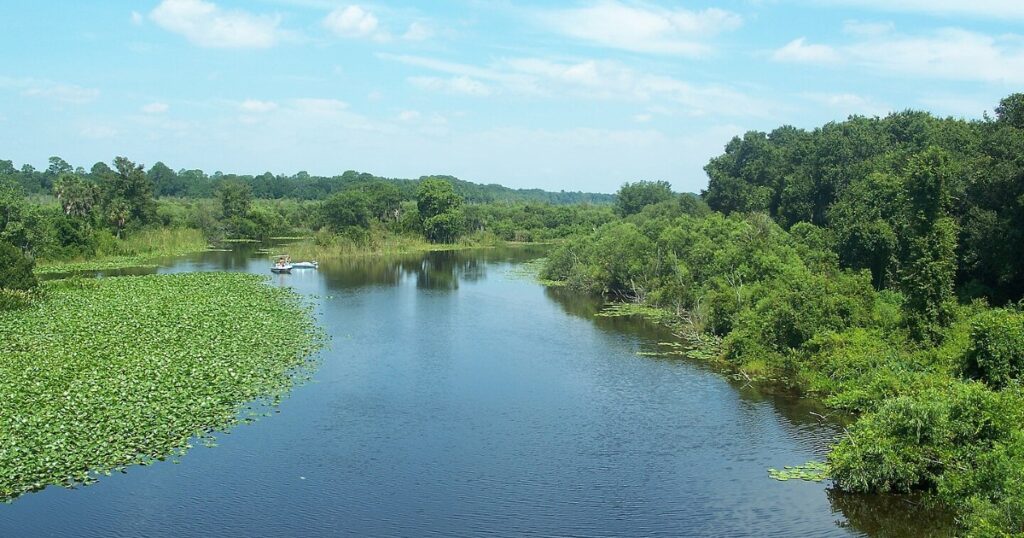The Florida Senate has taken a monumental step to reconnect and restore the 217-mile river system that extends from the origins of Lake Apopka to the Atlantic Ocean near Jacksonville. The project will reconnect Silver Springs with the Oklawaha River and St. John’s River.
The Senate Budget Committee on Agriculture, Environment and General Government has approved the 2025-26 subcommittee budget, which includes $6.25 million for restoration of the Oklawaha River. Proviso requires the Florida Department of Environmental Protection (FDEP) to develop a project plan for restoring the Ocklawaha River by July 1, 2026. Additionally, by December 31, 2035, FDEP has directed to lead the planning and complete construction.
The benefits of the Ocklawaha River Restoration Project are:
1. Generate long-term and hundreds of cumulative economic benefits, particularly in the countryside of Putnam and East Marion counties, in northeast Florida.
2. It could eliminate dam failures and the threat of serious flooding, leading to the loss of life and property for downstream communities.
3. Strengthen the Osceola (O2O) part of the Florida Wildlife Corridor from Ocala.
4. Complete the state’s largest Springs Restoration Project and benefits 20 lost springs in Florida, Silver Springs and the Oklawaha River.
5. Return native fish populations and expand outdoor recreation opportunities.
6. Supports healthier and more resilient lower St. John’s, Oklawaha, Silver Rivers and Spring.
Regional leaders praise the moves made by Senate leaders.
“The reconnection of Silver Springs and the Oklawaha River and St. John’s Rivers offers an expanded opportunity to Putnam County. It opens up new areas for banking fishing, camping and wildlife viewing, longer distance boating opportunities, family-friendly Springs, manatee spots and unique fishing experiences. Linda Myers, former Putnam County tax collector, county commissioner and local businessman, said:
“The blockage of fish and boat passages from the St. John’s River to Silver Springs has had a serious impact on our beloved Silver Springs and the surrounding communities. Park attendance has gone down, our giant catfish and other fish species have declined, our beautiful springs have declined, and the overall health of our beautiful springs has declined, and the restoration will promote more tourist dollars in our area and help the Silver Springs revival. The successful Marion County Tourism Tax, former marketing director at Florida Silver Springs
“Thank you to the Florida Senate for protecting the people in this area,” said Jessica Finch, former mayor and council member of Weraca town. “As a former Mayor of Weraka and councillor, my biggest fear was the failure of the dam and the threat of risk to our people and property.
“This visionary action by the Florida Senate should be praised statewide,” said Evan Tucker, Duval County businessman, co-founder and outdoorsman of Cowford Conservation. “As an avid fisherman and outdoorsman, I have seen water quality and reduced fish and shellfish habitat in the lower St. John’s River from Palatka to Jacksonville, and we are on the cliffs of an ecosystem where the ecology has collapsed, just like what happens in South Florida.
“As an Ocala City Councilman, I am committed to maintaining high quality quality for residents and memorable experiences for visitors,” said Ocala Councilman Jim Hilty. “Our springs and rivers are an important part of this. To maintain the beauty and resilience of Silver Springs, we would like to thank the Florida Senate for ensuring the quality of life for our community by restoring the Ockrawaha River and historic Silver Springs State Park.”
“Audubon celebrates this progress towards the recovery of the Oklawaha River, bringing new life to the ecology and economy of this important North Florida fork,” said Julie Raismell, executive director of Audubon, Florida.
The recovery of the Oklawaha River is a key step towards achieving Florida’s wildlife corridor goals, and Florida Nature Reserve celebrates the Senate’s proposed budget.
Additionally, the reconnection of Silver Springs and the Oklawaha River and St. John’s River leads to a meaningful recovery of the fork and an increase in flow to the St. John’s River and the mouth. We thank the Florida Senate for their leadership in managing our state’s critical ecosystems and water resources. – Greg Knect, executive director, Nature Conservancy, Florida.



